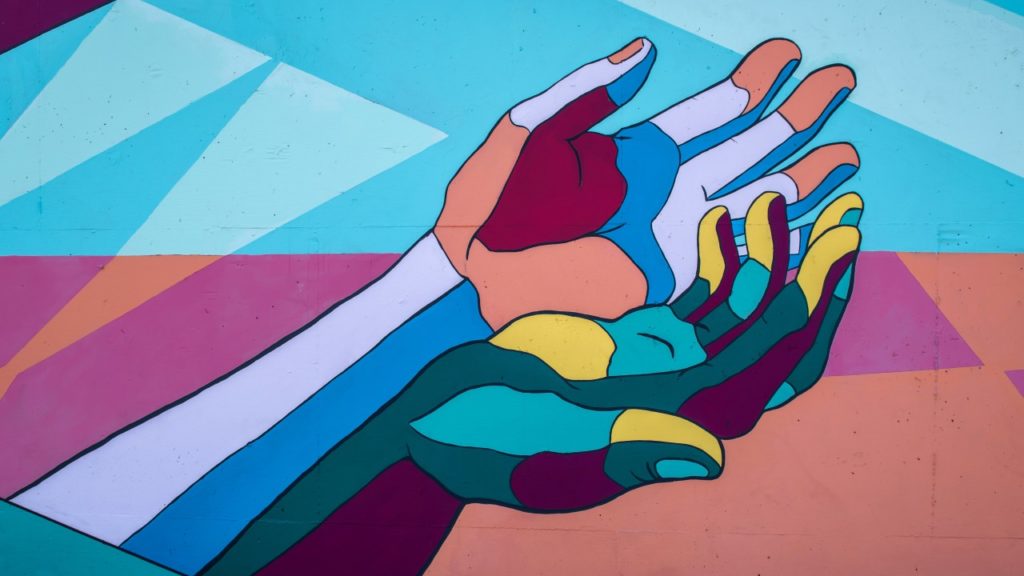Even for December in Chicago, it was cold. I could see my breath as I stamped my feet and shivered in the subway station. The reek of stale urine and the sight of a rat playing between the rails did nothing to improve the comfort level.
But it was my own fault I was freezing. The only coat I’d brought with me to college in August was a windbreaker.
In the city it’s better not to show that you’re suffering, because nobody cares anyway. So I stared straight ahead at the mildewed tunnel wall, wearing the protective mask of indifference and hoping the nice, warm train would pull up soon.
Suddenly, a guy standing nearby made eye contact.
He made a remark about the frigid weather — I agreed through chattering teeth. Then my new acquaintance shared his concern for the homeless people on the streets, who faced a long winter ahead.
It turned out that he worked for Streetwise, a weekly newspaper that speaks out about poverty and social justice issues. The paper is hawked on the street corners by homeless people, who use the money they earn for the necessities of life. My subway buddy’s role was to work with the vendors, helping them take steps to get off the streets with their new financial independence.
Just knowing what he chose to do with his life, I already admired this guy I’d known for five minutes. He asked me what I did — told him I was a student at Moody Bible Institute. He clearly wasn’t interested in Christianity, but he said, “Well, we have something in common — we both care about people in need.”
Then he did something amazing: He started to take off his coat.
“Here,” he said. “You’re freezing. I have a bunch of layers underneath and another coat at home. Why don’t you wear this?”
I stared. A total stranger who probably didn’t make much more money than I did offered me the coat off his back. I declined — I couldn’t possibly take it; he needed it; the train would be here soon and I could warm up.
But his actions turned my world upside down on an otherwise-ordinary day. This man who didn’t even know me — or Jesus — had just offered me the coat off his back.
Blessed Are …
In Matthew 5:1-12, Jesus preached his first public sermon — we call it the Beatitudes. And it began with this pronouncement: “God blesses those who are poor and realize their need for him, for the Kingdom of Heaven is theirs.” Jesus went on to promise good things to people who mourn; those who show mercy; those who work for peace.
Personally, I think the Beatitudes are good for a warm fuzzy. That stuff about blessings for the poor encourages me when I’m not sure where the rent’s coming from and I’m contemplating my wife’s $20,000 student loans.
But that doesn’t mean I “get it.” When I skim this passage for the 57th time, I don’t quite believe what Jesus is saying — I mean, not enough to put it into practice. The reality is that if Jesus blesses the poor and I’m trying to live like him, I should be the one giving away my coat on the subway.
“It doesn’t seem wise,” my mind insists. “How do I know that bum really needs a coat — what if he just sells it for drug money? Isn’t that why I take my old clothes to Goodwill?” So if I were to write my own Beatitudes, they wouldn’t sound quite so radical as the ones proclaimed by Jesus. They’d run something like this:
God blesses those who pull themselves up by their bootstraps, finding a good job with a 401(k), so they can live without fear of foreclosure. At annual review time, pointing out your accomplishments to your boss can really help with certain blessings called “raises.” The humble may inherit the earth, but they don’t get promoted.
God blesses those who don’t get overly concerned about justice for sweatshop employees or preborn children, so they can buy cheap shoes made in Asia and walk by abortion clinics without feeling bad about circumstances they can’t change anyway.
God’s blessing is upon people who have known little grief; whose parents are still living and have never been laid off unexpectedly or gone through a divorce, because they are happy.
God may bless those who forgive, but he understands sometimes we can’t let go and show mercy. So he probably blesses grudge-holders, too (so long as we don’t kill anybody). When I stick up for my rights I may have more arguments, but I’m ultimately blessed when I get to have things my way.
God must bless women who gossip after church and men who check out coeds in tank tops, because we all do it anyway.
God blesses people who figure out ways to subtly mention God in everyday life, but compromise just enough to keep from getting picked on. Doesn’t he want us to be happy?
Unfortunately, Jesus saw things a bit differently. His version of the Beatitudes completely turns our cherished American values — and even our cozy Evangelical subculture — upside down. He promised to bless the poor; the mournful; the humble — the very ones we kick to the curb every day. He claimed to support those who seek after justice, and those who go beyond justice to mercy, and those who fight against cultural filth to find purity of heart. He cares for people who are persecuted for his sake. Take time to look up Matthew 5:1-12 now. Read it slowly; try to appreciate just how foreign Jesus’ teachings are to our typical American way of thinking.
“The poor need to be blessed,” thought my friend who worked for Streetwise, “so I should be willing to give up my coat to a shivering college guy.” He didn’t know Jesus, but he acted more like a Christian than me.
Brother Bill
There are rare individuals who take Jesus’ upside-down living even further. When giving away coats isn’t enough, some are willing to lay down their lives.
On April 20, 1998, Time reported on another Chicagoan in the news. He’s known simply as “Brother Bill,” and he has a unique approach to confronting gang violence. He is a legend, I’m told, in Chicago’s worst neighborhoods.
At Moody Bible Institute, I lived a mile or so from Cabrini-Green, the notorious public housing projects where even the police sometimes feared to go. I never visited, except when I took a wrong turn once and was afraid I’d never come out on the other side. If you knew what was good for you in the late 1990s, you stayed out of Cabrini-Green. But not Brother Bill.
Ron Stodghill II writes in Time:
The phone calls usually come at night. The voice is always low, distressed, the tone conspiratorial. A Gangster Disciple or Vice Lord assigned to murder informs Brother Bill that warfare is on the horizon, that just moments before he was instructed to kill a rival gang member. “I don’t wanna shoot nobody, and I don’t wanna die, Brother Bill,” the voice whispers. “Please come over here. Nothing’s gonna happen if you’re here. Help me, man.”
According to Stodghill, that’s when Brother Bill starts to pray. But prayer is only the beginning. He immediately climbs into his car and drives from the suburbs to Cabrini-Green. There, he steps out of his car into the midst of gunfire, actually putting himself in the line of fire between the warring gangs.
He watches bullets fly past; hears gangsters shouting for him to get out of the way. But he will not be moved. Over 50 times, he’s stepped into the midst of a gun battle … and amazingly, the shooting has stopped each time. He demonstrates that he cares enough for these gangsters to take a bullet for them.
Brother Bill’s mission doesn’t end with stepping into the crossfire. He encourages young men in gangs to find honest jobs. He drives them to their court dates. He takes groups to watch Notre Dame football games. And ultimately, he wants to help them discover God.
Stodghill writes that Brother Bill once found a gang leader dying inside one of the squalid high-rises.
A 21-year-old gang leader [was] bleeding to death … from four gunshots to the chest. As the faint siren of the paramedics’ vehicle sounded, too far away, Brother Bill spoke softly into the ear of the young man the last words he would hear on this earth: “God made you. He loves you. He wants you to be with Him forever.”
Brother Bill knows what it means to weep with those who weep. He understands suffering for the sake of Christ — to him, it’s watching friends destroy their lives and die.
But if God truly blesses the peacemakers, Brother Bill is one of the most fortunate men alive.
Where Love Is, God Is
Some of us, if we’re honest, are thinking that we could never really understand the Beatitudes. We couldn’t walk into gunfire between gangs or give our coat to a stranger. As for me, when my pastor, suggested I write about the upside-down Kingdom of Heaven. I said, “I don’t know if I should … I’m not very good at living it.”
We might take small steps towards upside-down living. We won’t dodge bullets, but we could help one abused child. We could … and yet we’re not sure we will. Our tiny efforts will hardly make a difference.
In Leo Tolstoy’s short story “Where Love Is, God Is,” Martin Avdeitch didn’t think his contribution could possibly matter, either. But Jesus had a surprise in store for this Russian cobbler.
* * *
Martin was the only cobbler in a small village. He spent his days in a basement shop making and mending shoes.
Every evening when his work was done, Martin would light the lamp and open his Bible to the stories of Jesus in the Gospels. One night, he happened upon the story of the prostitute who washed Jesus’ feet with her perfume and tears, then dried them with her hair.
Martin was deeply affected by the woman’s great love. “I wonder,” mused Martin aloud. “If you came to me, Lord, would I treat you so well?”
Then — as it was very late — Martin blew out his lamp and went to bed.
Just before he drifted off to sleep, he heard a voice call his name. “Martin!” it said. “Martin!”
Martin looked around, but saw no one. “Who is it?” he whispered nervously.
“It is the One whose words you read,” said the voice. “Watch carefully, for tomorrow, I shall visit you.”
Martin sat upright in bed with a start. Had he truly heard Jesus speak to him — or was it only a dream? Martin couldn’t tell, but he lay awake for a long time.
The next morning, the old cobbler arose and sat down to his work. He was inclined to dismiss his strange experience of the night as a dream … but just to be sure, he watched carefully out the window all morning. He scrutinized the passers-by to see if one of them could be his savior.
Finally, as he was about to have lunch, Martin noticed a retired soldier named Stepanitch outside.
Stepanitch was very poor, and lived by performing odd jobs for the people of the village. Apparently, someone had paid him to shovel snow from the street. But the work was too much for him. Soon he was leaning against Martin’s doorway in exhaustion, breathing heavily.
Martin opened his door. “Stepanitch, I was about to brew tea and have lunch,” the cobbler said. “Would you come in?”
Stepanitch gratefully nodded his assent, and joined Martin for sandwiches and tea. But he noticed that throughout the meal, Martin kept glancing out the window. “Are you expecting someone?” the old man asked.
“I suppose not,” said Martin. “I had a dream, or a vision … I thought Christ said He would visit me today.”
Stepanitch looked at his host strangely. Martin poured him more tea. “It’s a silly thing; only a dream,” said Martin with a rueful smile. “But thank you for the company. You’re welcome any time, my friend.”
Stepanitch headed back out to his work. But now, he went with a gladder heart and warmer belly for the kindness Martin had shown him.
Martin sat down at his workbench once more. He continued to watch the street in spite of himself. Close to dinnertime, he saw a peasant woman dressed in a ragged summer dress trudging along the frigid pavement. She was carrying a baby who cried pitifully, wrapped in nothing but rags. The poor woman shivered violently, trying in vain to comfort her child.
Martin opened his door and motioned to the woman to step inside. She gratefully complied and warmed herself at Martin’s fire.
“Child, why are you wandering the street in rags?” asked Martin.
“My husband is a soldier,” said the woman. “He’s been gone for eight months; I don’t know if he’s dead or alive. I had a position as a cook, but they refused to keep me after the baby came. I had to pawn all of my winter clothes for food. I don’t know how we’ll make it through.”
Martin pitied the poor young woman — so young, and so alone. He took the soup he’d been heating over the fire and ladled it into a bowl for her. Then he went to his closet; took down an old cloak.
“Here,” he said, “take this for you and your child. I’m a poor man, but it’s something against the winter cold.”
She gratefully accepted the new garment as she ate ravenously. But she couldn’t help noticing that Martin glanced out the window every minute or so.
“Are you expecting someone?” the woman asked.
“Not really,” said Martin, with disappointment in his voice. “I had a dream last night … it’s a silly thing. I thought my Savior told me to watch the street, for He would come visit me today.”
“Well, stranger things have happened,” said the woman dubiously. But then she brightened — “I’m glad you were watching! Otherwise, my child and I might have frozen to death.”
Martin smiled and nodded. The woman finished her soup, then wrapped the child carefully in the new cloak and stood up to leave.
Before she left, the cobbler took a few coins from his purse. “Take these,” he said, pressing them into her palm. “Get your winter clothes out of pawn.”
The woman kissed Martin on both cheeks and headed out into the night with tears running down her cheeks, overjoyed to have found such kindness.
Martin took out his Bible and sat down by the oil lamp, as he did every night. Soon, he realized it was far too cold and dark for a traveler to be on the streets, and his “vision” from Christ must have been a dream after all. He was discouraged, and let the Scriptures fall open to a random page.
But before he began to read, he suddenly heard a voice in the darkness; the same one he’d answered the night before. “Martin!” it said. “Martin, didn’t you know me?”
He saw a shadowy form in the corner, and realized it was none other than Stepanitch, carrying his snow shovel. “It is I,” said Stepanitch, and disappeared.
Another shadow stepped forward — the mother and her child to whom Martin had given his cloak. “It is I,” said the woman, and disappeared.
Martin pinched himself — was he actually awake? Then he glanced down at the page to which his Bible had fallen open, and at the top, he read these words:
“Whatever you did for the least of my brothers and sisters, you did it for me.”
Suddenly, Martin realized that he had, in fact, been visited by his Savior. And as he drifted off to sleep, he thanked God for allowing him to see the face of Christ.
* * *
Do we trust Jesus enough that we’ll reach out in His name even when we can’t see the results? Do we believe that when we touch the poor, the mourning, and the pure in heart, that we are seeing the face of Jesus? Do we believe that at the same time, they have the opportunity to see Christ in us, and so be blessed?
You may not learn what good you’ve accomplished this side of heaven. But perhaps, like Martin the Cobbler, God will give you the faith to see that whatever you do for the least of His children, you did it for Jesus. Perhaps you, too, will understand that Martin’s dream came true, and that the Savior has really come to you on the day you serve Him.
So have you seen Jesus lately? Martin the Cobbler did. But then, he was watching.
Copyright 2008 George Halitzka. All rights reserved.












